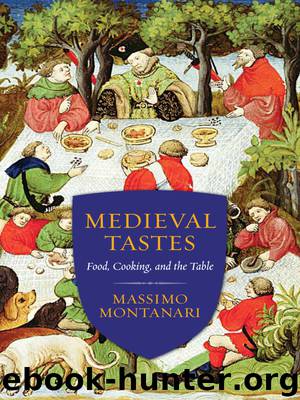Medieval Tastes: Food, Cooking, and the Table by Massimo Montanari Beth Archer Brombert

Author:Massimo Montanari, Beth Archer Brombert
Format: epub
Tags: HIS037010, History/Medieval, SOC055000, Social Science/Agriculture & Food
Publisher: Perseus Books, LLC
Published: 2015-04-13T16:00:00+00:00
*Marcus Aurelius Probus Augustus, referred to as Probus in Italian.—Trans.
†Only in Italian: sapore/sapere (flavor/knowledge), sapidità/sapienza (tastiness/wisdom).—Trans.
CHAPTER XIII
Rich Food, Poor Food
THE HISTORY OF food has a powerful social meaning, which sources reveal with relative clarity. To recognize the differences and dynamics of class in the structure of production, the modality and contrasts of distribution, the typology of daily consumption, and the symbolic values attributed to foods and to eating habits is fairly easy for the most part because all this emerges from the documentation. However, this topic is more difficult to define on more strictly technical grounds—that is, to take into account the way cooking was practiced. The relation between poor food and rich food and the separation between popular culture and elite culture in modes of preparation and in tastes are subjects that would seem to be inaccessible to anyone concerned with the Middle Ages (or any historic period). Because the written culture of those centuries was produced for the upper classes and oral sources are denied to the historian who is not dealing with contemporary matters, only the cuisine of the well-to-do has been documented, albeit in a discontinuous manner, and passed down from archival and literary sources, whereas we are forced to remain silent on the cuisine of the poor or, at best, to propose indirect hypotheses, interpolating texts and working from fantasy.
True? In theory, yes. But a more detailed reading of the sources has convinced me of the contrary. Indeed, written texts never express the culture of the lower classes, and yet they demonstrate it, with greater fidelity than we might have thought. I have reached this conclusion by analyzing cookbooks that began to appear in Italy as of the fourteenth century. As we have already seen,1 there are two principal families of cookbooks: one of southern origin that has its progenitor in the Liber de coquina, from the Angevine court of Naples (presumably based on a Sicilian archetype from the thirteenth century), and that was subsequently copied with additions and variants in various parts of central and northern Italy; the other of Tuscan origin, probably Sienese, which also spread to many regions, with adaptations that also included linguistic ones. When poring over these gastronomic-philological matters in a book written jointly with Alberto Capatti,2 I extended my interest in such texts to the beginning of the modern era, delving into the rich fifteenth-century cookbook of Maestro Martino and then, going forward and back, into the Renaissance cookbooks by Cristoforo Messisbugo and Bartolomeo Scappi. The latter cookbook was a monument to the Italian art of cooking, a summa of gastronomic knowledge gathered by the author over decades of association with the cooking and cultures of different regions, from Milan to Venice, and from Bologna to Rome, the city in which he ended his career at the court of Pope Pius V, to whom he dedicated in 1570 his Opera, a modest title for a work of magisterial substance.
There is an abyss between the technical and linguistic expertise of
Download
This site does not store any files on its server. We only index and link to content provided by other sites. Please contact the content providers to delete copyright contents if any and email us, we'll remove relevant links or contents immediately.
Born to Run: by Christopher McDougall(7120)
The Leavers by Lisa Ko(6945)
iGen by Jean M. Twenge(5408)
Sapiens by Yuval Noah Harari(5365)
Spare by Prince Harry The Duke of Sussex(5176)
The Kite Runner by Khaled Hosseini(5170)
Machine Learning at Scale with H2O by Gregory Keys | David Whiting(4292)
Bullshit Jobs by David Graeber(4179)
Never by Ken Follett(3937)
Goodbye Paradise(3799)
Livewired by David Eagleman(3764)
Fairy Tale by Stephen King(3370)
A Dictionary of Sociology by Unknown(3073)
Harry Potter 4 - Harry Potter and The Goblet of Fire by J.K.Rowling(3060)
The Social Psychology of Inequality by Unknown(3018)
The Club by A.L. Brooks(2919)
Will by Will Smith(2908)
0041152001443424520 .pdf by Unknown(2843)
People of the Earth: An Introduction to World Prehistory by Dr. Brian Fagan & Nadia Durrani(2727)
